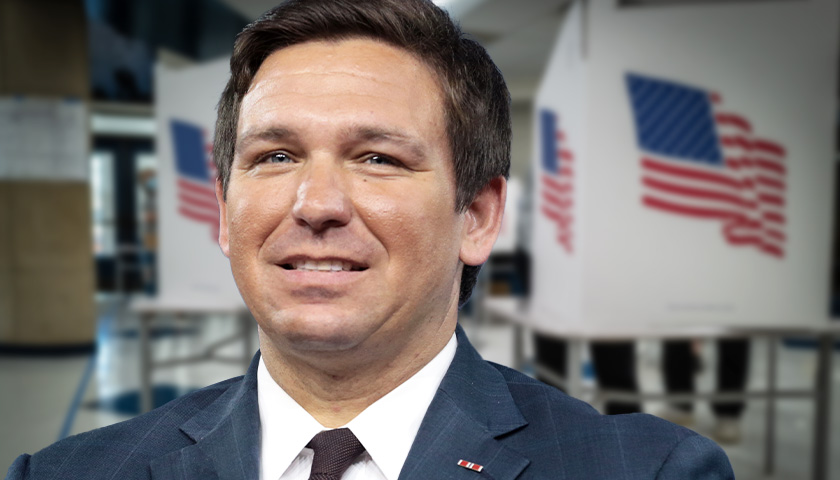by Bethany Blankley
An election reform bill is heading to Gov. Ron DeSantis’ desk. He’s expected to sign it.
It’s the second election reform bill in two years the legislature has passed after a 2020 election audit “passed with flying colors, in terms of how that’s going,” Gov. Desantis said last year.
A hallmark provision of the bill is the creation of a new Office of Election Crimes and Security within the Department of State, which DeSantis urged the legislature to create last November.
SB 524, filed by state Sen. Travis Hutson, proposes a range of election integrity reforms. It passed the Senate on March 4 by a vote of 24 to 14 and passed the House on March 9 by a vote of 76 to 41.
It requires the Secretary of State to notify the attorney general if signatures required for an initiative petition are no longer valid and requires election supervisors to maintain their voter registration lists every year, including identifying and confirming change of address information. It requires the Department of State to identify deceased registered voters using information received by specified agencies and take them off the voter roles.
It institutes several reforms and requirements for individuals observing the ballot duplication process, including requiring them to sign a specified affidavit acknowledging certain criminal penalties. It increases the fine that can be imposed on a third-party voter registration organization for failing to meet certain criteria from $1,000 to $50,000. It also increases the criminal penalty for ballot harvesting to a third-degree felony and specifies that it’s a Level 1 offense.
“Effective January 1, 2024, it also conforms the mailing and canvassing timeframes for ballots in an all mail ballot election to those for vote-by-mail balloting in regular elections and applies the criminal penalty for early release of election results to canvassing conducted for all-mail-ballot elections,” according to the bill analysis. It also tightens security on areas where ballots can be dropped off and boosts criminal penalties for fraudulently completing a ballot to a felony from a misdemeanor.
Of the bill, Senate Majority Leader Debbie Mayfield said, “Florida leads the nation in election integrity because we have taken a proactive approach to addressing and anticipating any election issues. To ensure Florida remains a national model for free and fair elections, we established a clear framework to investigate elections violations, improved voter roll maintenance, continued our commitment to securing vote-by-mail ballots, and increased and expanded penalties for those who illegally interfere in our elections.”
The new Election Crimes and Security office would be staffed by 15 people tasked with investigating allegations of voter fraud, initiating independent inquiries, and taking over the management of the state’s voter fraud hotline. They would be required to report their findings annually to the governor, Senate president and House speaker. No other state has such an office.
Manny Diaz, the Florida Democratic Party chairman, said the new office would “create a chilling effect on voting, and sow even more distrust in our elections,” The Hill reported.
Others argue the new office isn’t needed because voter fraud “is rare.” In 2020, the Department of State received 262 election fraud complaints “and referred 75 to law enforcement or prosecuting authorities,” it states on its website.
Republicans and Democrats said Florida’s election process in 2020 was the “gold standard,” WCJB 20 ABC-20 News reported. It also reported that last year’s election reform bill was “watered down” and Democrats said it would cause “voter suppression.”
Once signed into law, it would become effective immediately.
– – –
Bethany Blankley is a contributor to The Center Square.
Photo “Ron DeSantis” by Gage Skidmore. CC BY-SA 2.0. Background Photo “Election Day 2020” by Phil Roeder. CC BY 2.0.








